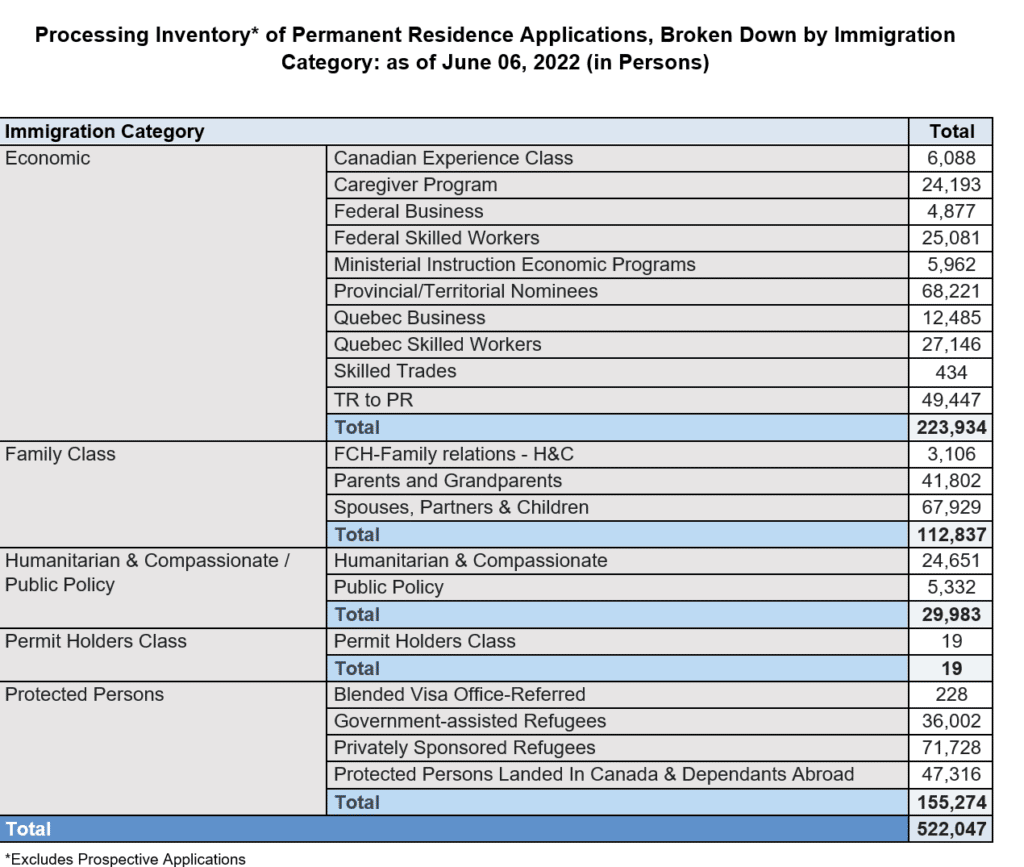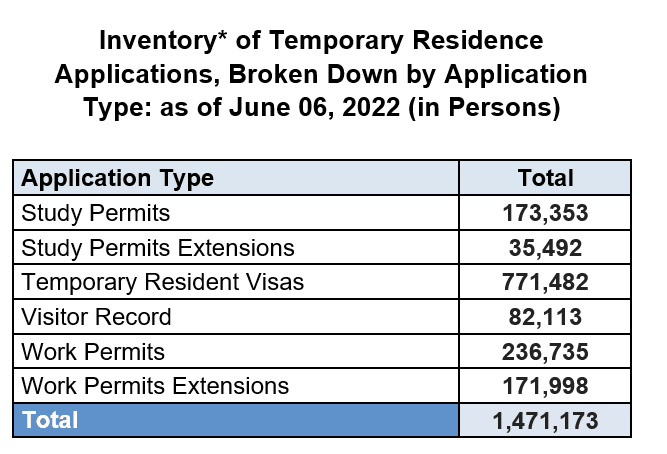Immigration
Canada’s immigration backlog jumps to 2.4 million persons
The backlog has grown by nearly 260,000 persons over the past month.

The temporary residence backlog is at 1,471,173 persons, an increase of 216,382 persons compared to April 29 (back then it stood at 1,200,791 persons). (File Photo: Yolanda Suen/Unsplash)
IRCC’s backlog has grown to 2.4 million persons.
The backlog has grown by 257,499 persons over the past month, largely due to a significant increase in temporary residence applications.
The citizenship inventory stands at 394,664 applicants as of June 1, compared to 399,325 on May 2.
The permanent residence inventory stands at 522,047 persons as of June 6.
The temporary residence inventory has grown to 1,471,173 persons, also as of June 6.
CIC News submitted a request for this updated data to Immigration, Refugees and Citizenship Canada (IRCC) on May 31. It received the data on June 15.
The backlog has progressed as follows since last summer:
- June 1-6, 2022: 2,387,884 persons
- April 30-May 2, 2022: 2,130,385 persons
- April 11-12, 2022: 2,031,589 persons
- March 15 and 17, 2022: 1,844,424 persons
- February 1, 2022: 1,815,628 persons
- December 15, 2021: 1,813,144 persons
- October 27, 2021: 1,792,404 persons
- July 6, 2021: 1,447,474 persons
Express Entry backlog continues to improve
The inventory of the three Express Entry programs has improved over the past month. It stands at 31,603 persons compared to 40,889 at the end of April.
The Canadian Experience Class (CEC) inventory is 6,088 persons, compared to 7,522 persons on April 29.
The Federal Skilled Worker Program (FSWP) inventory is 25,081 persons compared to 32,883 persons.
The Federal Skilled Trades Program (FSTP) inventory is 434 persons compared to 484 persons in late April.
IRCC implemented a pause on draws to FSWP and FSTP candidates in December 2020 amid the pandemic, and did the same for CEC candidates in September 2021. In recent months it has prioritized finalizing Express Entry applications so it can resume invitations to candidates of all three programs in early July. Once these draws resume, IRCC has pledged to go back to its pre-pandemic service standard of processing most Express Entry applications within six months.
Quebec skilled worker and PNP inventory also improve
The inventory of Quebec skilled workers has declined to 27,146 persons compared to 32,130 in late April.
The Provincial Nominee Program (PNP) inventory has also declined to 68,221 persons compared to 72,194 persons.
On the other hand, the Temporary Residence to Permanent Residence (TR2PR) Program inventory continues to increase, and is up to 49,447 persons compared to 44,449 persons. IRCC operated the TR2PR Program between May and November 2021 to allow some 90,000 candidates in Canada to apply for permanent residence.
Family class inventory is up
The overall inventory of family class applicants is up to 112,837 persons compared to 108,863 persons.
The Spouses, Partners and Children Program is up slightly compared to late April. It stands at 67,929 persons compared to 67,102 persons.
The Parents and Grandparents Program (PGP) has risen again, and is now at 41,802 persons compared to 38,478 persons. IRCC has yet to announce details on its plans for the PGP 2022. It recently announced that effective July 4, it is implementing reforms that will allow certain parents and grandparents to remain in Canada for up to seven years per entry under the Super Visa.
Temporary residence backlog up by over 200,000 persons
The temporary residence backlog is at 1,471,173 persons, an increase of 216,382 persons compared to April 29 (back then it stood at 1,200,791 persons).
The growth of the temporary residence inventory at this time of the year is normal to an extent. There is a significant seasonal component to temporary residence applications, primarily due to certain segments looking to come to Canada between the spring and fall. For instance, most international students submit their study permit applications at this time of the year so they can begin their studies in Canada by the start of the academic year in late August and early September. As another example, it is also common for more people to submit more temporary residence visa (TRV) applications at this time of the year as they look to visit Canada during the warmer months between the spring and autumn.
The main exception is the Canada Ukraine Authorization for Emergency Travel (CUAET), which since March has been available to Ukrainians looking to move to Canada. IRCC’s website reports that 296,163 CUAET applications have been received between March 17 and June 8.
As such, the overall TRV inventory has grown to 771,482 persons compared to 621,451 as of April 29.
Meanwhile, the study permit backlog is at 173,353 persons compared to 132,280 persons.
The work permit inventory is at 236,735 persons compared to 189,061 persons.
The work permit extensions inventory has also grown to 171,998 persons compared to 144,842 persons.
What the Canadian government is doing
In late January, IRCC provided an update to the public on its efforts to manage its inventory, achieve more of its application processing standards, and modernize the immigration system. This entails making greater investments in technology and hiring more staff.























